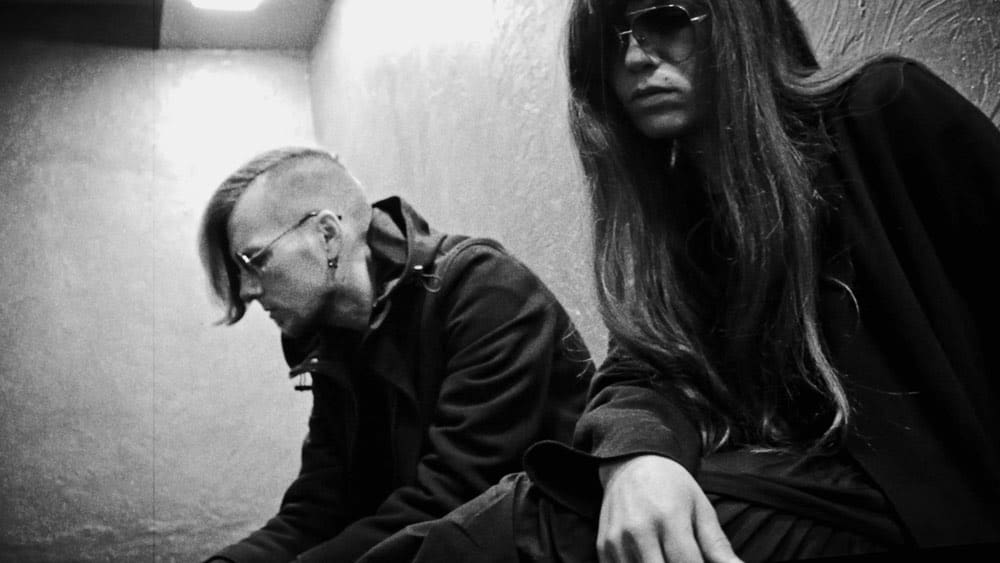Click Interview with VEiiLA: ‘It Felt Natural To Leave The Past And Embrace The Present In Its Raw And Painful Way’


VEiiLA
VEiiLA was formed around 2015 by Russian duo Vif Nüte and Bes Eirid. As they explain they were already making music together for quite some time before VEiiLA. They shifted to synthesizers and made a conscious decision to focus on Electronic music. They by the end of 2023 released their second full length album “Sentimental Craving For Beauty”. This work released on Projekt Records is a true masterpiece mixing different influences like Ambient, Trip-Pop and Cinematic music. The album is an artistic creation standing for grace and emotion. Behind the writing and release of “Sentimental Craving For Beauty” also hides tragic events. Vif and Bes decided to leave their homeland right after the start of the war in Ukraine. They’re now living in Armenia. I got in touch to ask them a few questions about music and the terrible events they’re still going through.
(Courtesy by Inferno Sound Diaries)
Q: You last year released your second album “Sentimental Craving For Beauty” which I can imagine must have been really special to you, right? What does this release mean to you – and especially after you guys left Russia because of the war in Ukraine?
Vif: Leaving everything known behind for unlimited unknown. Knowing no one in a new country. I didn’t know that it would be like this. But it felt that it was the only right choice at the time. The transformation was pretty harsh. I remember this overwhelming loneliness that wrapped us so thick. I thought one could surely suffocate in it. It seemed like the only way to survive was in making this album. Concentrate everything in one direction and shut the reality away.
Bes: Yes, like a horse that wears blinders, so it can see only what’s directly ahead.. And, yes, it is special. Not specifically the release (as something that we presented to the world), but more in a personal way, the impact that writing this album had on our life. It was the way of despair that led to these songs, but the process of writing, playing and recording them was for us that proverbial straw to which a drowning man clings as the last resort. Whatever we may think or feel now is going to be pale in comparison to that deluge of despair that swept us away when we heard the war news for the first time. And when you leave your life and just wander like a vagabond, there is no time to catch a break, your life will basically alternate between two states –anxiety and despair. If you just drift like this you’d either collapse or drown. Thankfully Nature provided us with self-preservation instinct, like all the other animals, so we frenziedly focused on the creative process. That first year, when our life was the most uncertain, unsteady and stressful, was the most creatively productive time, and I think that is the reason we are still here, alive and considerably sane.
Q:So in which way did these tragic events had an impact on the writing of your album?
Vif: It turned everything inside out. And it doesn’t stop really. The separation and alienation of spirits. It’s so ruinous in so many ways. At least I can tell that the desire to make music didn’t leave us and makes even more sense now because nothing else does.
Bes: I think it is still to unfold and the real impact is still to be realized and understood. Now we are in a psychological limbo, we are only beginning to see the effects, but we have no idea of the long-term effects that are to come. What I can say for sure is that us, and many other Russians, who had to leave the country, those who left for ideological and moral reasons, are in a transitional state. We are like Romani people to the world, not homeless, but without home; with the exception that those had been living with no home for centuries, and we are complete dilettantes in this lifestyle. But I feel it, when talking to other drifters who we meet sometimes, to old friends who are all scattered around the world now – most of us slowly but surely accept this nomad state. It’s strange, because you know that you can’t go back, you are an alien to your ex-homeland. Your ex-countrymen don’t see you as one of their own anymore, and honestly the feeling is mutual. But wherever you are now, however welcoming the land and people are, this is not home either. And so you accept the transient nature of your existence, you stop thinking in terms of home, roots, future or past, you drift in the now and just try to occupy yourself with whatever comes your way, just for the sake of not going insane. Because once you stop and think for a moment the hopelessness and despair creep in. And so the immigrants are always busy running around, doing something, planning grandiose deeds for the next week, yet never speaking about the future.
Q: You already had songs from the album finished before you left your country and had to write everything back again. How do you look back at the composing and production of this work? And what kind of album did you want to achieve – before and after you left?
Bes: Yes, we had something that we thought would be the album, but it just didn’t feel right anymore. I guess the acuteness of everything that we felt revealed some new sides of us to ourselves and the songs that we had at that moment no longer correlated with our current state.
Vif: It felt natural to leave the past and embrace the present in its raw and painful way. To get it through and find the melancholy beauty that makes any sadness look refined.
Bes: Also we shifted away from our ‘old’ approach to production, which was mostly revolving around nerding out in front of the computer screen. Instead we focused on playing live, and that required new arrangements, new imposed minimalism, which engaged the more creative way of thinking. And this is a much more interesting and fulfilling experience than moving things on the screen with the mouse.
Q: I read that the title of the album was inspired by the famous “Forsyte Saga” of John Galsworthy. Tell us a bit more about it and what do you especially like in the writing of Galsworthy plus how did you adapt it into music?
Vif: The connection is more of a subtle type. But I’ve always been fascinated with literature and all these abundant different ways to deliver the thoughts and the truth. And this phrase touched me profoundly the first time I read it.
Bes: It’s funny, we’ve already seen explanations provided by other people who find connection in our music with the social themes of the “Forsyte Saga”. Every time we see it mentioned it looks strange, like it’s about some other band, not us really. What I mean is that the fact that the line ‘sentimental craving for beauty’ came from Galsworthy doesn’t really mean a direct reference to the theme of the book. It was a beautiful phrase that meant and means something deeply personal to us, it’s like one of those moments when you read something in a book and you think it’s about you. But that’s the beauty of expression, the language, the personal allegory to our own soul. For example, our first album is called “The Nation Of One”, which is the derivative of ‘the nation of two’ in Vonnegut’s “Mother Night”. Does it mean that the album explores the same themes as “Mother Night”? Of course nobody yet connected that album to “Mother Night” or the themes of Holocaust, spies, moral responsibilities, passive contribution to evil or whatever else you could pull from that. Why? I think because we failed to mention it anywhere and therefore didn’t give the direction to these thoughts.
With “Sentimental Craving For Beauty” we mentioned Galsworthy, for the obvious reason of giving credit and of course because we have a passion for literature and we think it’s a good consequence if someone would want to pick up a great book after listening to our album. But with all that it becomes weird at times, that we have to put on a defense and explain that ‘no, our album isn’t concerned with the class-division of the English society of the 19th century’. But I guess it’s true that between what I think, what I want to say, what I think I say, what I actually say, what you hear, what you think you hear and what ideas you extract from what you think you heard, lies an enormous gulf filled with foaming chaos. Still worth a try though.
Q: When listening to “Sentimental Craving For Beauty” I feel emotion, grace, sensuality but also reverie. I finally get the impression there’re positive vibes running through it. Did I catch the essence of what you tried to express? And what did you really want to express and what are the images coming into mind when you listen to the album?
Vif: Our songs in this regard are stark naked. Life is a very complex matter, so many delicate things run through us. But art helps to put it into perspective, to sieve through, to focus on the important things. I can say that making this album helped me get through the depths of darkness. Maybe we subconsciously wanted hope to be at least in our songs, because we didn’t see it in real life. I think we were searching for beauty that would startle us, seize our attention and show us the way out. To see a new day that would dazzlingly shine through the thick black fog of reality…
Bes: But it is hard for us to perceive our work objectively. And it makes me sad at times. I wish I could somehow listen to our music as a listener, you know, subjectively, without estimating it as our work. But I don’t think it’s possible. I also think that whatever you hear and feel in the songs is true and right, because that’s the beauty of music: it is the universal language, it is free of the cage of logic, as it lives in the province of feelings, and therefore it can speak to a soul directly. As for our own perception – it constantly changes, as we play the songs, they take new shapes, the same words appear to have new meaning in the light of new events or new personal discoveries. I can say for sure that we still like and enjoy playing these songs and that means something.
Q: What are the future plans for VeiiLA and for you as Russian exiled citizens?
Bes: Plans? What’s ‘plans’? The word sounds familiar, but the meaning escapes me. Seriously though, as musicians we are always busy with something, playing shows, writing, recording. As human beings, we stopped making plans. What’s the point? Future is a vicious heartless beast. The present is no better at times, but at least it passes, and sometimes it can be interesting and even pleasant.
Vif: Can you be more outcast then you were before? The thing is: we were always like this really, we’ve never belonged to anyone or anything, it just became clear and acute, but not essentially different after all, it just adds some new shades to our outcast lifestyle.
Since you’re here …
… we have a small favour to ask. More people are reading Side-Line Magazine than ever but advertising revenues across the media are falling fast. Unlike many news organisations, we haven’t put up a paywall – we want to keep our journalism as open as we can - and we refuse to add annoying advertising. So you can see why we need to ask for your help.
Side-Line’s independent journalism takes a lot of time, money and hard work to produce. But we do it because we want to push the artists we like and who are equally fighting to survive.
If everyone who reads our reporting, who likes it, helps fund it, our future would be much more secure. For as little as 5 US$, you can support Side-Line Magazine – and it only takes a minute. Thank you.
The donations are safely powered by Paypal.









